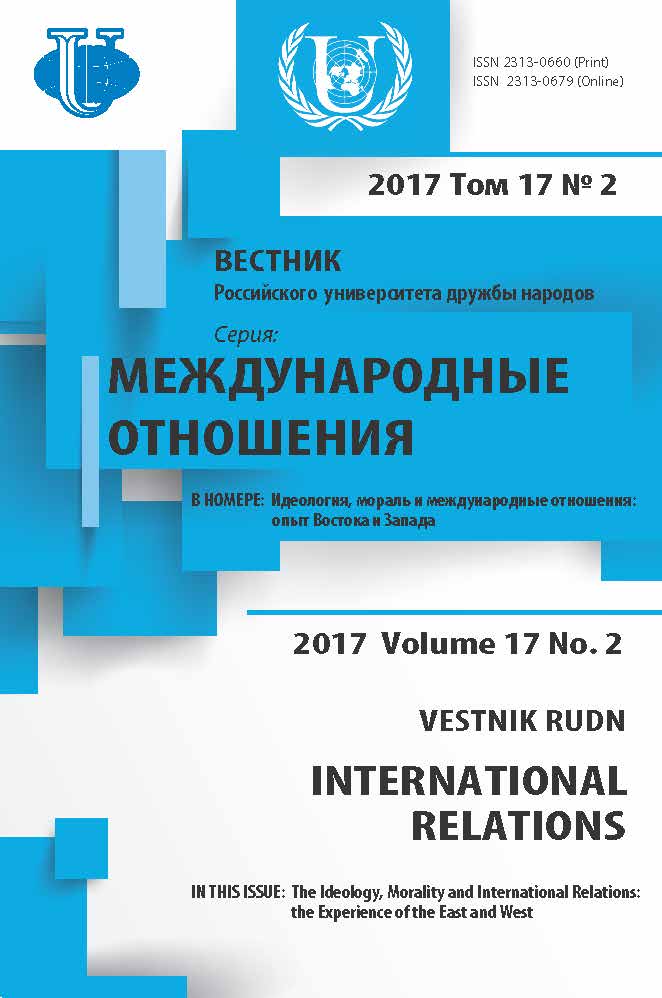Interpretive sociology of foreign policy: “agent” model of state behavior on the international arena
- Authors: Timofeev I.N.1
-
Affiliations:
- MGIMO (U) of Ministry of Foreign Affairs of the Russian Federation
- Issue: Vol 17, No 2 (2017): The Ideology, morality and international relations: the experience of the East and West
- Pages: 265-278
- Section: THEMATIC DOSSIER
- URL: https://journals.rudn.ru/international-relations/article/view/16062
- DOI: https://doi.org/10.22363/2313-0660-2017-17-2-265-278
Cite item
Full Text
Abstract
The article revisits the utility of sociological theories for the students of international relations. The failure of IR scholars to predict Ukrainian crisis revealed the limits of realism, which still remains most influential IR theory. These limits make rethink the prospects of convergence of IR and sociological theories. Pros and cons of holistic constructivist theory are examined. The article results in making an “agent-focused” model composed of the concepts of Max Weber’s interpretive sociology, Graham Allison’s typology of models of decision making and Mark Haas’s model of ideological origins of great powers’ politics. In doing so, it also revisits the concept of identity as a mean to understand “social facts” and their influence on foreign policy. The emphasis on the “agent” though not the “structure” is approached as an alternative to holistic constructivism of Alexander Wendt and his epigones. The “agent” model is supposed to be more capable for studies of great powers’, which play an active role in setting up the “structure’s” parameters. Three different approaches to “agent” are considered - “agent” as a state, as a bureaucratic body or structure within the state and as decision-makers and their staff. The model is designed for further empirical research of the Russian foreign policy.
About the authors
Ivan Nikolaevich Timofeev
MGIMO (U) of Ministry of Foreign Affairs of the Russian Federation
Author for correspondence.
Email: itimofeev@russiancouncil.ru
Moscow, Russia
References
- Alekseeva, T. A., Mineev, A. P, Fenenko, A. V., Loshkarev, I. D. & Anan'ev, B. I. (2016). Why Constructivism In IR Needs a “Quantum Reform”? Vestnik MGIMO, 6, 7—13. (In Russ.).
- Anthology of IR Theory. (2002). Edited by P. A. Tsygankov. Moscow: Gardariki. (In Russ.).
- An Anthology on Sociological Theory. (2002). Edited by S. P. Bankovskaya. Moscow: Knizhnyi dom universitet, Vol. 1. (In Russ.).
- Barabanov, O. N., Bordachev, T. V., Luk'yanov, F. A., Suslov, D. V., Sushentsov, A. A., Timofeev, I. N. (2017). Global Revolt and Global Order. How to Deal with the Revolutionary Situation in the World? Moscow: Valdai Discussion Club. (In Russ.).
- Bull, H. (2002). The Anarchical Society: A Study of Order In World Politics. New York: Columbia University Press.
- Degterev, D. A. (2016). Dissemination of Cultural Norms and Values: Agent-Based Modeling. Vestnik RUDN. International Relations, 16 (1), 141—152. (In Russ.).
- Durkheim, E. (1995). Sociology: Its Aim and Method. Moscow: Kanon. (In Russ.).
- Haas, M. (2007). The Ideological Origins of Great Power Politics, 1789—1989. Ithaka: Cornell University Press.
- Smith, E. (2004). Nationalism and Modernism. Moscow: Praksis. (In Russ.).
- Sorokin, P. (2000). Social And Cultural Dynamics. Saint Petersburg: Izdatel'stvo RKhGI. (In Russ.).
- Timofeev, I. N. (2008). Balance of Power, Interdependence and Identity: Empirical Models of Security Dilemma. Vestnik MGIMO, 3, 48—59. (In Russ.).
- Timofeev, I. N. (2009). Security Dilemma. Risk of Armed Conflict between the Great Powers. Polis. Political Studies, 4, 8—33. (In Russ.).
- Timofeev, I. N. (2014). World Order Or World Anarchy? An Approach To Contemporary IR System. RIAC Working Papers, 18. (In Russ.).
- Waltz, K. (2010). Theory of International Politics. Long Grove: Waveland Press.
- Wendt, A. (1999). Social Theory of International Politics. Cambridge: Cambridge University Press.











